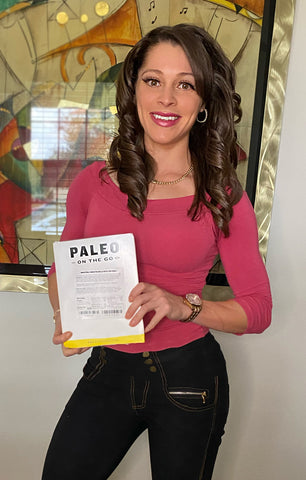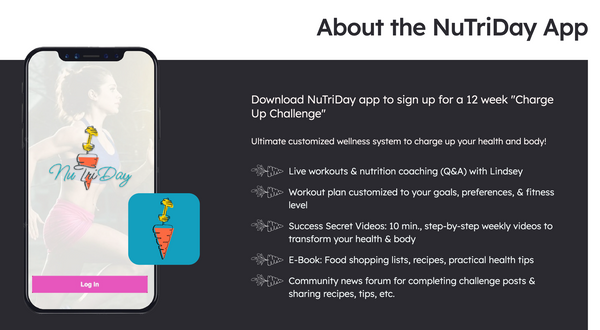
Top 5 Health Benefits Of Including Organ Meat In Your Diet

Here are the TOP 5 health benefits of including organ meat in your diet, from Certified Trainer and Nutrition Coach Lindsey Day.
When you think "SUPERFOOD" you probably don't think "LIVER!" You also might think an organ used to process toxins from the body could be toxic to eat.
Contrary to this logic, LIVER is actually one of the most underrated superfoods! Its nutrient density outshines an entire plate full of fruits and veggies, as it is loaded with Vitamin A, B vitamins, Iron, Copper, Selenium, Phosphorous, Magnesium, CoQ10, Carnitine and alpha lipoic acid, just to name a few (1,2).
Did you know that suboptimal nutrition is a huge culprit behind the development of many diseases and poor immune system function(3)?!
Here are my top 5 benefits of eating liver and organ meat:
BENEFIT 1: Boosts Energy Levels
This is partly thanks to the B vitamins which are critical for energy production! Mitochondria are organelles in our cells that produce energy, and organ meat is loaded with nutrients that support mitochondrial health, such as carnitine and CoQ10 (1,2). Plus, selenium supports thyroid health. Thyroid hormones determine our energy levels (4).
BENEFIT 2: Improves Detoxification Capacity
Organ meat is abundant in Selenium, Alpha Lipoic Acid (ALA) and CoQ10 – nutrients that fight oxidative stress and are absolutely necessary for efficient detoxification in the body (1,2).
BENEFIT 3: Anti-Aging benefits
Aging is caused by excess oxidative stress in the body. Just by breathing and being alive, we are constantly subject to oxidative stress. Our body has built in mechanisms to cope with this, but these mechanisms rely on antioxidants, like the ones mentioned above (1,2).
BENEFIT 4: Improves Brain Health
You’ll also find generous amounts of magnesium and omega 3s in organ meat – nutrients needed to optimize brain function. Oftentimes, studies reveal those with depression, brain fog, ADHD, and other neurological impairments are deficient in key nutrients like these (5,6,7).
BENEFIT 5: Enhances exercise performance and weight loss
Carnitine, creatine and ALA can really take your workout to the next level. Creatine especially is proven to yield some of the most significant improvements in strength and exercise performance. Some people take creatine supplements, but meat (especially organ meat), is a natural way to get creatine! Better exercise performance translates to a better body composition (fat loss and muscle building) (1,2).
Do yourself a favor and avoid low-quality organ meats! It’s important to eat from organic, grass-fed or pasture-raised animals.
I know some people LOVE the taste of liver, but unfortunately I can’t say the same! Knowing how good it is for health, I’ve tried to cook it myself in a way that’s palatable and have failed miserably! I was excited to try the POTG Teriyaki Chicken Liver and POTG Ancestral Cuban Picadillo. It was the first time I actually ENJOYED eating liver! I never would’ve imagined it possible! The POTG Ancestral Cuban Picadillo is my favorite!
 Lindsey Day is a Certified Personal Trainer, Nutrition Coach, a former broadcast meteorologist and is the founder of NutTriDay Fitness and the NuTriDay Fitness App. Lindsey is currently working on obtaining her Master's in Nutrition and is helping people achieve optimal health and wellness through better nutrition and fitness. Learn more at: nutridayfitness.com
Lindsey Day is a Certified Personal Trainer, Nutrition Coach, a former broadcast meteorologist and is the founder of NutTriDay Fitness and the NuTriDay Fitness App. Lindsey is currently working on obtaining her Master's in Nutrition and is helping people achieve optimal health and wellness through better nutrition and fitness. Learn more at: nutridayfitness.com

Would you benefit from a customizable fitness and nutrition challenge program? Are your interested in burning fat, building muscle, balance hormones & gut health, boosting your energy, and bettering your mental health? If so, you would be an ideal candidate for the NuTriDay app developed by Lindsey Day! Visit her Instagram account @lindseydayfitness or the NuTriDay website to learn more about her wellness app and the 12 week “charge up challenge."
References:
-
Islam, M. A., Khandker, S. S., Kotyla, P. J., & Hassan, R. (2020). Immunomodulatory Effects of Diet and Nutrients in Systemic Lupus Erythematosus (SLE): A Systematic Review. Frontiers in immunology, 11, 1477. https://doi.org/10.3389/fimmu.
2020.01477 -
Wahls, T., Rountree, R. (2017). The Wahls Diet for Multiple Sclerosis A Clinical Conversation. Alternative and Complementary Therapies. 23(3), 79-86. https://www.liebertpub.com/
doi/pdf/10.1089/act.2017. 29109.twa -
Reider, C. A., Chung, R. Y., Devarshi, P. P., Grant, R. W., & Hazels Mitmesser, S. (2020). Inadequacy of Immune Health Nutrients: Intakes in US Adults, the 2005-2016 NHANES. Nutrients, 12(6), 1735. https://doi.org/10.3390/
nu12061735 -
Sahebari M, Rezaieyazdi Z, Khodashahi M. Selenium and Autoimmune Diseases: A Review Article. Curr Rheumatol Rev. 2019;15(2):123-134. doi:10.2174/
1573397114666181016112342 -
Biel, W., Czerniawska-Piątkowska, E., & Kowalczyk, A. (2019). Offal Chemical Composition from Veal, Beef, and Lamb Maintained in Organic Production Systems. Animals : an open access journal from MDPI, 9(8), 489. https://doi.org/10.3390/
ani9080489 -
Huss, M., Völp, A., & Stauss-Grabo, M. (2010). Supplementation of polyunsaturated fatty acids, magnesium and zinc in children seeking medical advice for attention-deficit/
hyperactivity problems - an observational cohort study. Lipids in health and disease, 9, 105. https://doi.org/10.1186/1476-511X-9-105 -
Xue, W., You, J., Su, Y., & Wang, Q. (2019). The Effect of Magnesium Deficiency on Neurological Disorders: A Narrative Review Article. Iranian journal of public health, 48(3), 379–387.




